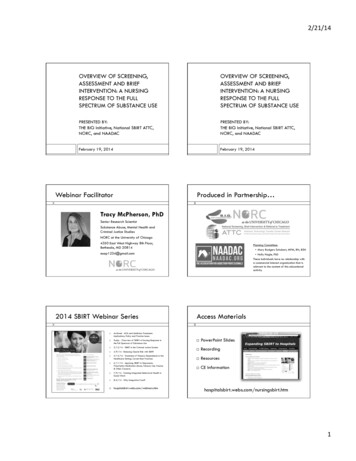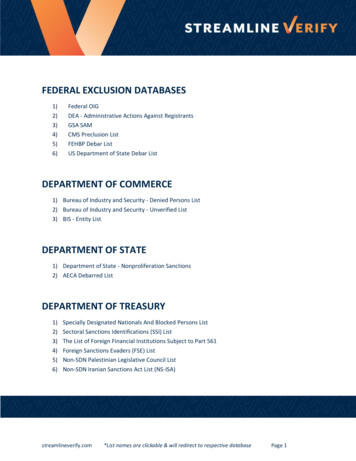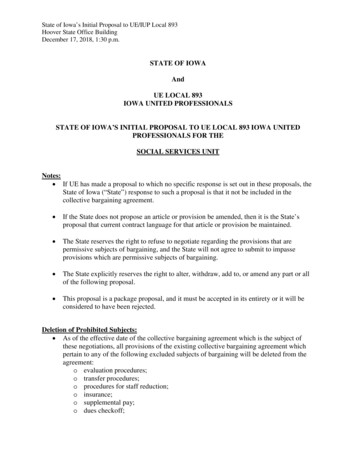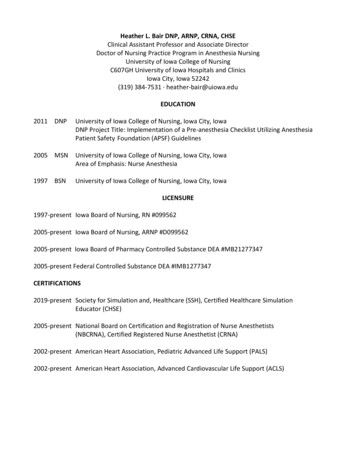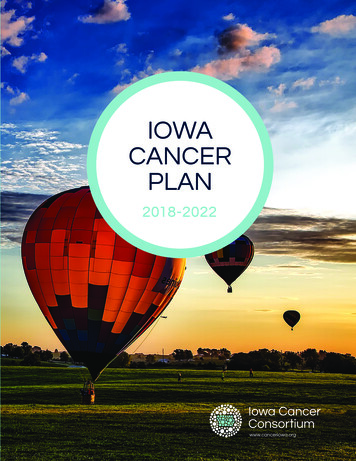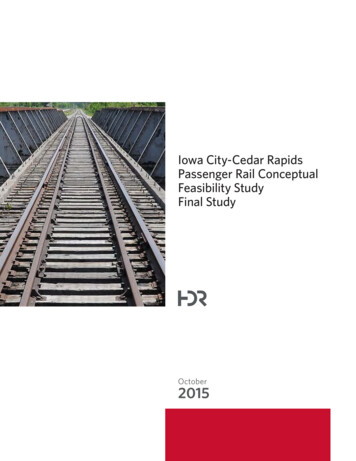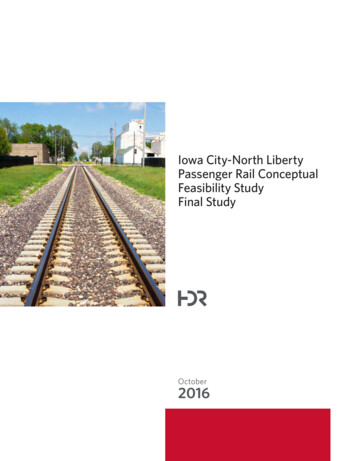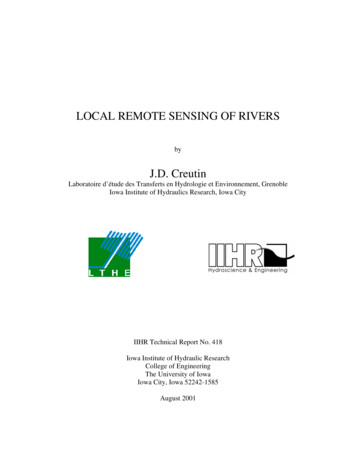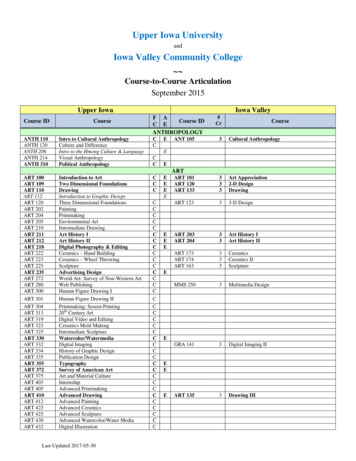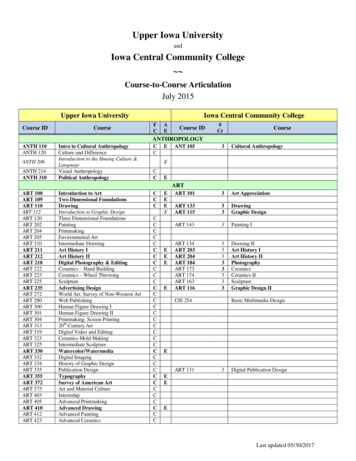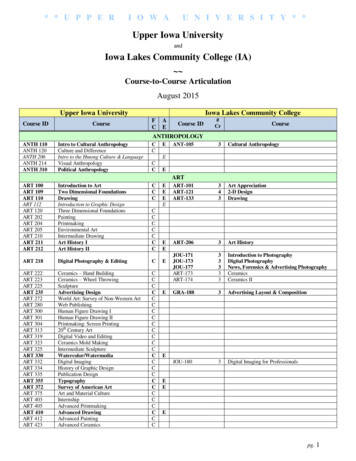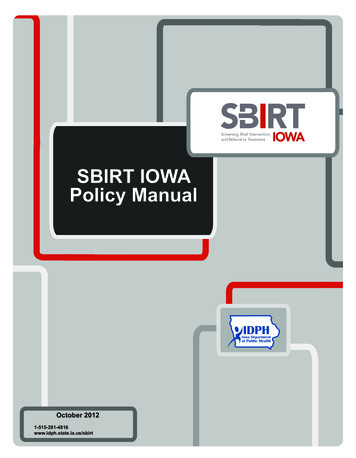
Transcription
SBIRT IOWAPolicy ManualIDPHIowa Departmentof Public HealthOctober 20121-515-281-4816www.idph.state.ia.us/sbirt
A.IntroductionScreening, Brief Intervention and Referral to Treatment (SBIRT) Iowa is a five-year grant awarded tothe Iowa Department of Public Health (IDPH) by the Substance Abuse and Mental Health ServicesAdministration, Center for Substance Abuse Treatment (SAMHSA) in July 2012. SBIRT Iowaservices will use a comprehensive, integrated, public health approach, based on universalscreenings, to identify, reduce, and prevent risky alcohol or drug use, abuse, and dependence onalcohol and drugs. Through SBIRT Iowa partnerships, IDPH will co-locate substance abuseprofessionals from local IDPH-funded treatment agencies at Federally Qualified Health Centers(FQHC’s) in Blackhawk, Polk, Scott and Woodbury counties and Camp Dodge, home to Iowa’sNational Guard.SBIRT Iowa will increase the numbers of individuals screened for substance use/misuse,provide brief intervention and clinically appropriate services in Iowa’s FQHCs and NationalGuard, and implement a strategic plan for statewide diffusion of SBIRT services.SBIRT Iowa is consistent with IDPH’s “recovery-oriented system of care” approach that expands andenhances the state’s continuum of care to include universal screening, brief intervention, and referralto treatment services for adults, age 18 and over. Total funding available for SBIRT Iowa coveredservices is 7,575,000. SBIRT Iowa will provide the following services each year of the grant, fromNovember 1, 2012 through October 30, 2017:ServicePrescreeningScreeningBrief InterventionBrief TreatmentReferral to TreatmentNumber of individuals to beseen35, 5958,898890890890SBIRT covered services are managed through IDPH’s Iowa Service Management and Reporting Tool(I-SMART) data system. FQHC, National Guard and substance abuse agency staff enter SBIRTservices into their electronic health record and the I-SMART system, either through direct link or webinterface. Pre-Screening, Screening, Brief Intervention and Brief Treatment services are funded bySBIRT Iowa. For individuals receiving Brief Treatment or a Referral to Treatment, co-pays, drugtesting and transportation can be funded through SBIRT, for individuals who do not have insurance orability to pay. Providers must submit quarterly expenditures via SharePoint for treatment servicesrendered. All expenditures received will be matched to services entered into the ISMART clinicalrecord system. For more information on the SBIRT process, see Appendix A-Flow Charts.SBIRT policies and requirements are addressed in this Policy Manual. SBIRT information is alsoavailable at www.idph.state.ia.us/sbirt.This Policy Manual and its requirements are incorporated by referenceinto IDPH contracts with SBIRT providers. 1SBIRT Iowa Policy Manual October 2012
B.SBIRT Vision and PrinciplesSBIRT Iowa is a public health approach which promotes integration of routine screenings andinterventions within Federally Qualified Health Center and the National Guard to ensure amore coordinated and comprehensive approach to chronic disease management.Iowa’s implementation of SBIRT is based on the following principles:Individuals with substance abuse or misuse disorder have the right to a coordinated approachto chronic disease management.Individuals should be given tools to maximize the use of proven self-management techniquesto improve their health status outcomes.Individuals are part of a recovery-oriented system of care that honors each individual’sfamilial, cultural, spiritual, economic, and logistical needs.Universal screenings and brief interventions strengthen individual commitment to and successin reduction or absence of alcohol or drug use/misuse, and assist in promoting optimumwellness.Participation in SBIRT is voluntary and can be terminated by the individual at any time, withoutrepercussion to the individual.IDPH is committed to shared decision-making with its partners and stakeholders to ensure asuccessful SBIRT project. Examples of these include: discussions, advisory council meetings,individual and provider surveys, and solicitation of staff feedback during IDPH site visits.IDPH staff is available for technical assistance and case consultation.C.SBIRT Iowa Individual EligibilityAn individual who meets all of the following criteria is eligible for participation in SBIRT:1.2.3.4.resident of the state of Iowaage 18 or olderscreen positive for at-risk or hazardous levelsreceive services at an established, contracted SBIRT provider siteFQHC and National Guard staff must maintain and documentindividual eligibility, Government Performance and Review Data (GPRA), Pre-Screening andScreening results from the Two-Question Pre-Screen, the AUDIT and DAST, and BriefIntervention, Brief Treatment, and Referral to Treatment covered services.D.SBIRT Iowa PartnersSBIRT Iowa includes a large and diverse team of partners including: researchers, Medicaidrepresentatives, medical, substance abuse and National Guard professionals, public health andtraining support agencies from the following partners: 2SBIRT Iowa Policy Manual October 2012
Central Iowa House of MercyIowa Behavioral Health AssociationIowa Medicaid EnterpriseIowa Primary Care AssociationMECCAPrimary Health CareTraining ResourcesUnited Community ServicesEastern Iowa Center for Alcohol & Drug Services, Inc.Community Health CareNorthern Iowa Pathways Behavioral ServicesPeoples Health CenterWestern Iowa Jackson Recovery CentersSiouxland Community Health CenterStatewide and National Partners E.FEi, Inc.Iowa Consortium for Substance Abuse Research and EvaluationIowa National GuardSubstance Abuse and Mental Health Services AdministrationSBIRT Implementation ProcessesFor the purposes of this project, IDPH has established protocols for each SBIRT covered serviceslisted below. Providers should follow their agency established policies and procedures when providingservices to individuals presenting in a medical crisis or intoxicated state.1. Pre-Screening:All SBIRT participants receive a universal Pre-Screening using a Two-Question pre-screen(see Appendix B-Pre-Screening Questions): How many times in the past year have you had 5(male) or 4 (female) or more drinks ina day? How many times in the past year have you used an illegal drug or used a prescriptionmedication for non-medical reasons? 3SBIRT Iowa Policy Manual October 2012
Universal screening helps identify the appropriate level of services needed based on theindividual’s risk level. Individuals, who indicate little or no risky behavior and have a PreScreening score of 0, may not need further intervention. Individuals who score above a zeroon either question are considered “positive pre-screened” clients, and will be referred for anAUDIT and/or DAST-10 full screen. Pre-Screening typically takes 1-2 minutes. See appendixB-Pre-Screening Questions.At FQHCs, Pre-Screening is conducted by FQHC staff. At the National Guard site, PreScreening is provided by National Guard and co-located substance abuse treatmentagency staff.2.Screening: AUDIT and DAST-10Positive “pre-screened” individuals will be provided the AUDIT and/or DAST-10. If theindividual pre-screens positive on the alcohol related question, the AUDIT is given. If theindividual pre-screens positive on the drug-related question, the DAST-10 is given. If theindividual pre-screens positive on both questions, both the AUDIT and DAST-10 are given.The Alcohol Use Disorders Identification Test (AUDIT) identifies preliminary signs ofhazardous drinking and mild dependence (see Appendix C. AUDIT). It is used to detectalcohol problems experienced within the last year. It is one of the most accurate alcoholscreening tests available, rated 92 percent effective in detecting hazardous or harmfuldrinking. The test (See Appendix C. AUDIT) contains 10 multiple choice questions on quantityand frequency of alcohol consumption, drinking behavior and alcohol-related problems orreactions. Each question ranges in point value from 0 to 4. Scores from questions 1-8 rangefrom 0 to 4 as follows: The first response for each question (never) score 0The second (monthly or less) score 1The third (2-4 times per month) score 2The fourth (2-3 times per week) score 3The fifth (4 or more times per week) score 4Scores from questions 9-10 have three responses and score at 0, 2 or 4 points.Questions 1-10 are scored on a point system as outlined below:Score0–78 – 1516 – 1920 or moreRisk LevelLow-risk level/NegativeRisky or Hazardous levelHigh-risk or Harmful levelHigh-riskRecommendationEncouragement and EducationBrief InterventionBrief TreatmentReferral to TreatmentThe Drug Abuse Screening Test (DAST-10) was designed to provide a brief instrument forclinical screening and treatment evaluation research (see Appendix D. DAST-10. The testcontains 10 self-report items that are combined in a total DAST score to yield a quantitativeindex of problems related to drug misuse. For all questions, with the exception of question 3,each “yes” response receives 1 point and each “no” response receives 0. For question 3, a“no” reply receives 1 point and ‘yes” receives a 0. The answers are scored on a point systemas outlined below:Score0Risk LevelLow risk levelRecommendationEncouragement and Education 4SBIRT Iowa Policy Manual October 2012
1-23-56- 10Moderate risk levelSubstantial risk levelSevere risk levelBrief InterventionBrief TreatmentReferral to TreatmentEncouragement and Education consists of offering words and written advice about risks ofalcohol and drug usage; praise for current low risk practices; and a reminder to stay withinrecommended allowances if they do drink or use drugs.At FQHCs, Screening is conducted by FQHC staff. At the National Guard site, Screening isprovided by National Guard and co-located substance abuse treatment agency staff.3. Brief Intervention:The goal of a Brief Intervention (can take as little as 5 minutes) is to educate individuals andincrease their motivation to reduce risky behavior. Using Motivational Interviewingtechniques, individuals are provided information specific to their alcohol or drug use.Substance use/misuse occurs on a continuum and services are prescribed based on wherethe individual screened resides on that continuum. With that being said, the majority ofindividuals Pre-screened using the SBIRT process will not be deemed appropriate for anyservices.Brief intervention consists of having a brief motivational conversation with an individual andguides the person through the standard drink sizes and safe drinking levels (recommendedlimits), the drinkers pyramid, and the physical effects diagram. The clinician gauges theindividual’s readiness to change and motivation for change and provides feedback about theresults, discusses the individuals AUDIT/DAST-10 score, discusses the area(s) of concern,provides encouragement to reduce their risks and discusses the risks of continued drugand/or alcohol use. The clinician assists the individual in setting a wellness goal and ends thesession with praise and encouragement.At FQHCs, Brief Intervention service is conducted by FQHC staff. At the National Guardsite, Brief Intervention is conducted by National Guard and co-located substance abusetreatment agency staff.4. Brief Treatment:The goal of Brief Treatment (usually 5-12 sessions) is to change not only the immediatebehavior or thoughts about a risky behavior, but also to address long-standing problems withharmful drinking and drug misuse and help individuals with higher levels of disorder obtainmore long term care. Brief Treatment may also require the use of Motivational Enhancementand Cognitive Behavioral approaches to help individuals address unhealthy cognitions andbehaviors associated with current use patterns and adopt change strategies.Individuals who score positive and voluntarily consent for Brief Treatment interventions mustsign a Brief Treatment Consent and Release of Information (see Appendix E- Brief TreatmentConsent; and Appendix F- Release of Information). Brief Treatment Consents and Release ofInformation forms should be obtained by the FQHC/National Guard Staff and provided to theco-located substance abuse treatment staff. A copy of the consent should be provided to theindividual.Generally, SBIRT Brief Treatment services meet the American Society of Addiction MedicinePatient Placement Criteria 2R (ASAM) Level 0.5 Early Intervention criteria. ASAM is the mostwidely used and comprehensive set of guidelines for placement, continued stay and dischargeof patients with addiction disorders. On occasion, SBIRT Brief Treatment will meet ASAM 5SBIRT Iowa Policy Manual October 2012
Level I Extended Outpatient Treatment. Substance abuse agency staff shall evaluateindividuals using professional clinical judgment to determine if further assessment using theASAM criteria is required. If ASAM Level I treatment services are recommended, theindividual should be discharged from SBIRT Brief Treatment and be referred to the treatmentagency. If the individual chooses to receive this service at the FQHC/National Guard, thiscould be provided pending the provider meets Iowa Plan contractual requirements. If anindividual meets criteria for treatment services that the treatment provider is contracted toprovide, this individual may be counted towards Iowa Plan for Behavioral Health contractualminimum individual number requirements as long as all of the requirements of the Iowa Plancontract and agency licensure/accreditation standards are met.Brief Treatment consists of sessions matched to the individual’s motivational level and stageof change. Stages of change include: Pre-contemplation (feedback about results andinformation of misuse); Contemplation (benefits of change, resource sharing, pro’s/con’s ofuse, risks of delaying, ambivalence challenge, goal review); Preparation (choosing a goal,praise and encouragement) action (trigger reduction, putting plan in action, healthy behaviorsubstitution, support network) and Maintenance (continued goal setting for relapseprevention). Clinicians may refer individuals to self-help and/or faith-based programs and ifclinical judgment and/or stage of individual dictate, may refer to higher level of care.At FQHC sites and at the National Guard, Brief Treatment is conducted by the co-locatedsubstance abuse treatment agency staff. If the Audit and DAST-10 are both positive and alevel of recommendation is provided, the provider should record the highest score andprovide the highest level of recommendation between the AUDIT and DAST-10.5. Referral to Treatment:Referral to Treatment is made when this service is recommended through use of one of theidentified screening tools used in Iowa’s SBIRT project. Referral to treatment is determinedby the AUDIT and/or DAST 10 scores. The referral is generally facilitated by the communityhealth staff or the National Guard staff. The co-located treatment provider may assist in thereferral process.Referral to Treatment consists of discussions with the individual to support them in gettingspecialized substance abuse treatment. The clinician uses motivational interviewing andprovides feedback about results (use exceeds limits, current problems that exist, dependencesymptoms, dangers to health (medical, psychiatric, social), and the clinician provides clearmessages about continued risk of use. The clinician provides resources and referrals andmay obtain assistance from the co-located substance abuse professional. The cliniciancoordinates medical, psychiatric and or substance abuse referrals and providesencouragement and support.Referral to Treatment is conducted by the substance abuse treatment agency at theiragency location and not at the FQHC or National Guard. 6SBIRT Iowa Policy Manual October 2012
F.PaymentSBIRT provider’s document provision of SBIRT covered services, enter Pre-Screenings, Screenings,Brief Interventions, Brief Treatment and Referral to Treatment in the SBIRT I-SMART system andsubmit requests for payment to IDPH, as described below: Each SBIRT provider must submit quarterly expenditures via SharePoint by the 15th of themonth following each quarterly period that summarizes payment requested for all SBIRTcovered services. Treatment providers must also submit quarterly expenditures viaSharePoint by the 15th of the month following each quarterly period that summarizespayment requested for substance abuse treatment co-pays (co-pays for treatmentservices at the Iowa Plan/SBIRT provider are reimbursable through SBIRT funding onlywhen there is no other funding source for that service) drug testing services, GPRAincentives, and transportation bus passes/gas cards/cab expenditures.Substance abuse agency staff is responsible for determining and documenting lack offunding for treatment services, rendered co-pays, use of GPRA data incentives,transportation expenditures, and drug testing expenditures.Generally, IDPH processes and pays claim requests within 60 days of receipt.Providers should adhere to their own agencies billing, licensure, coding and paymentprocedures.If an SBIRT covered treatment service is a covered service under any other payor,that service cannot be submitted to IDPH for payment,regardless of whether or not payment is received from that other payor.G. GPRA Data Collection RequirementsAs part of the SBIRT grant, participating providers are required to collect GPRA (GovernmentPerformance Results Act) data at three specific times, using the GPRA tool: Intake (Program admission/baseline) 6 Month Follow-up (5-8 months after the GPRA Intake) DischargeFor SBIRT GPRA data collection, an individual may be discharged and counted again only if theindividual is coded in a different category (screening and positive feedback, brief intervention, brieftherapy or referral to treatment, but one individual will only count once in each category. Thefollowing indicates which specific GPRA requirements are to be met at which time in the GPRAprocess:Pre-Screening OnlyClient Profile Information (Section A of the GPRA Tool)Screening OnlyBaseline Intake Data (Section A of the GPRA Tool)Screening andBrief InterventionBaseline Intake Data (Sections A and B of the GPRA Tool) 7SBIRT Iowa Policy Manual October 2012
Screening andBrief Treatment-Discharge Data Upon completion of a Brief Intervention, the GPRA discharge,Sections A, J and K of the GPRA tool must be completed on theindividual.Follow-up Data For a representative 10% sample of individuals in this categorywho should have or did receive brief intervention, the follow-upGPRA items asked are limited to the substance use domain andfollow-up sections of the tool (See Sections A, B and I of theGPRA tool). Data must be collected at 6 months after baseline and enteredinto the CSAT web-based GPRA data entry and reportingsystem. This can occur anywhere between 5 and 8 months afterGPRA intake/baseline. CSAT will provide grantees the samplingmethod to obtain the representative sample of 10%. Grantees will be notified which individuals have been selectedas part of the representative sample and need to be located forfollow-up via a web based notification report. Consent for SBIRTfollow-up is obtained at time of GPRA intake. Grantees are expected to achieve a follow-up rate of at least80% of those selected for the follow-up sample. GPRA follow-ups will be completed by co-located substanceabuse treatment providers and may be conducted by telephone. Six-month GPRA follow-up interviews must be completed witheach individual selected. Interviews may be conducted withinthe 5-8 month window. In order to assist the providers in locatingthe individuals, substance abuse treatment providers should askSBIRT participants to list at least two personal contacts (Thisinformation can be collected using Appendix G- SBIRT Iowa Collateral Contacts Form or in the profile section of I-SMART),and sign a release of information to each contact to help theprovider locate the individual to complete the GPRA Follow-upInterview.Baseline Intake Data (Sections A through G of the GPRA tool)Discharge Data If Brief Treatment is completed more than 7 days from the timeof intake, Sections A through G, J and K of the GPRA tool mustbe completed on the individual. If the treatment is 7 days or less from the time of intake,Sections A, J and K of the GPRA tool must be completed.Follow-up Data For a representative 10% sample of individuals in this categorywho, based on the results of their screening, should have or didreceive services beyond brief intervention, follow-up data (alldomains, see Sections A through G and I of the GPRA tool) areto be collected at 6 months after the initiation of substanceabuse treatment services CSAT will provide grantees the sampling method to obtain therepresentative sample of 10%. Grantees will be notified which individuals have been selectedas part of the representative sample and need to be located for 8SBIRT Iowa Policy Manual October 2012
Screening andReferral to Treatmentfollow-up via a web-based notification report. Consent forSBIRT follow-up is obtained at time of GPRA intake.Grantees are expected to achieve a follow-up rate of at least80% of those selected.GPRA follow-ups will be completed by co-located substanceabuse treatment providers and may be conducted by telephone.Six-month GPRA follow-up interviews must be completed witheach individual selected. Interviews may be conducted withinthe 5-8 month window. In order to assist the providers in locatingthe individuals, substance abuse treatment providers should askSBIRT participants to list at least two personal contacts (Thisinformation can be collected using Appendix G- SBIRT Iowa Collateral Contacts Form or in the profile section of I-SMART),and sign a release of information to each contact to help theprovider locate the individual to complete the GPRA Follow-upInterview.Baseline Intake Data (Sections A through G of the GPRA tool)Discharge Data If Treatment is completed more than 7 days from the time ofintake, Sections A through G, J and K of the GPRA tool must becompleted on the individual. If the treatment is 7 days or less from the time of intake,Sections A, J and K of the GPRA tool must be completed.Follow-up Data For a representative 10% sample of individuals in this categorywho, based on the results of their screening, should have or didreceive services beyond brief intervention, follow-up data (alldomains, see Sections A through G and I of the GPRA tool) areto be collected at 6 months after the initiation of substanceabuse treatment services CSAT will provide grantees the sampling method to obtain therepresentative sample of 10%. Grantees will be notified which individuals have been selectedas part of the representative sample and need to be located forfollow-up via a web-based notification report. Consent for SBIRTfollow-up is obtained at time of GPRA intake. Grantees are expected to achieve a follow-up rate of at least80% of those selected. GPRA follow-ups will be completed by co-located substanceabuse treatment providers and may be conducted by telephone. Six-month GPRA follow-up interviews must be completed witheach individual selected. Interviews may be conducted withinthe 5-8 month window. In order to assist the providers in locatingthe individuals, substance abuse treatment providers should askSBIRT participants to list at least two personal (This informationcan be collected using Appendix G- SBIRT Iowa - CollateralContacts Form or in the profile section of I-SMART) and sign arelease of information to each contact to help the provider locatethe individual to complete the GPRA Follow-up Interview. 9SBIRT Iowa Policy Manual October 2012
GPRA interviews must be entered into the I-SMART system within seven calendar days of the date ofthe interview. A SBIRT consent must be obtained by the individual anytime a GPRA Follow-up isconducted (see Appendix H- GPRA Follow-up Consent). Information regarding the administration ofthe GPRA tool can be found in the SBIRT User Guide at entiality of client information is an ethical obligation for all providers and a legal right for everyindividual, whether such information is received verbally or in writing and whether it is received fromthe individual or a third party. SBIRT providers must comply with confidentiality of client informationand protected health information requirements as set forth in state and federal regulations.Providers conducting GPRA Intakes (Section A through G) ask SBIRT participants to list threepersonal contacts on the Collateral Contacts Form within the client profile in the ISMART system, andsign a release of information to each contact to help the provider locate the individual to complete theGPRA Follow-up Interview.Providers should use the unique client identification number assigned by the ISMART system whenreferring to an SBIRT participant in written communications, including e-mail. The provider may notdisclose protected health information in e-mail communications.I.Additional RequirementsSBIRT providers must comply with the following additional requirements:1.Audit or Examination of RecordsThe Auditor of the State of Iowa or any authorized representative of the State and, whereFederal funds are involved, the Comptroller General of the United States or any otherauthorized representative of the United States Government, shall have access to, and theright to examine, audit, excerpt and transcribe any pertinent books, documents, paper, andrecords of the provider related to order, invoices, or payments of the SBIRT contract. Theprovider agrees that IDPH may have access to client SBIRT records.2.Cultural CompetenceSBIRT participants have the right to culturally competent services. If a provider is unable toprovide SBIRT services to an individual with specific cultural needs, the provider should locateappropriate services for the individual or contact IDPH for assistance in locating services.3.Health and SafetyAll individuals shall be served in a safe facility. Providers shall maintain documentation of allinspections and correction of all cited deficiencies to assure compliance with state and localfire safety and health requirements. All facilities must be clean, sanitary and in good repair atall times. All facilities will be tobacco free environments. Firearms and other weapons areprohibited on the premises.4.Volunteer PolicyVolunteers who work with SBIRT participants must comply with policies required by theprovider through which they volunteer and with the SBIRT Policy Manual. Volunteers mustfollow standard provider personnel policies, including, but not limited to: ethical behavior, 10SBIRT Iowa Policy Manual October 2012
safety, confidentiality, protected health information, computer use, financial responsibility, anddrug and alcohol use.5.Conflict of InterestThe contractor shall establish safeguards to prevent employees, consultants, and members ofgoverning bodies from using their positions for purposes that are, or give the appearance ofbeing, motivated by the desire for private gain for themselves or others with whom they havefamily, business, or other ties. SBIRT participants may not purchase services or goods fromany person or persons whom a potential conflict of interest may occur.6.Program EvaluationThe Iowa Consortium for Substance Abuse Research and Evaluation will evaluate, review andanalyze data from all five project sites through outcome reporting, interviews, qualitativediscussions, and site visits. The Consortium will monitor fidelity to the SBIRT model throughdata collection and analysis, interviews, surveys and focus groups.J.Guiding PrinciplesProvider staff and volunteers must comply with the guiding principles listed below. Provider staff whoare licensed or certified in a specific profession must comply with the code of ethics for theirprofession as well as with the guiding principles, whichever is the higher standard. SBIRT participants and family members are treated with honesty, dignity, and respect. Providers shall abstain from alcohol or other drug usage prior to or during the provisionof SBIRT services. Providers shall not accept commissions, gratuities, rebates, gifts, favors, or any otherform of non-IDPH payment for SBIRT services. Providers shall not misrepresent themselves or their qualifications, licensing or otheraccreditation requirements, education, experience, or status. Providers shall not perform services outside their area of expertise, scope of practice,training, or applicable license or other accreditation by the State of Iowa. Providers who are unable to provide a service to a participant will refer the individual toa provider qualified to provide that service. Providers shall not discriminate on the basis of color, age, gender, sexual orientation,national origin, socio-economic status, spiritual/faith beliefs, psychiatric or physicalstatus, or culture, ethnic, or racial background. Providers shall not participate in false or fraudulent activities including, but not limitedto, submission of claims for services not rendered, submission of false data, knowinglyassisting another provider to enter false claims or data, charging a individual for all orany part of a service, and/or providing false representation of credentials,qualifications, insurance, or licensure documents.K.Monitoring and EvaluationIDPH monitors and evaluates SBIRT services and providers. Monitoring and evaluation areasinclude, but are not limited to, individual eligibility, provider eligibility, provider facilities and policies,service documentation, ISMART data, GPRA reporting, SharePoint, critical and provider incidents,and satisfaction surveys. IDPH will conduct site visits and may talk with SBIRT individuals and with 11SBIRT Iowa Policy Manual October 2012
provider staff. Providers are gen
SBIRT covered services are managed through IDPH's Iowa Service Management and Reporting Tool (I-SMART) data system. FQHC, National Guard and substance abuse agency staff enter SBIRT services into their electronic health record and the I-SMART system, either through direct link or web interface.
